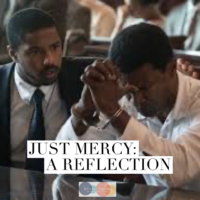
Over the holidays I read Bryan Stevenson’s book Just Mercy. This weekend our family went to see the moive. If you are unfamiliar, Just Mercy is written by the attorney who thirty-years ago started Equal Justice Initiative, a non-profit legal practice dedicated to helping wrongly condemned prisoners, the poor, women and adolescents caught in the criminal justice system.
I don’t think you can read the book/go to the movie without seeing the need for criminal justice reform. For most of us though, that’s not something we can do much about. But I also don’t think you can read the book/go to the movie without looking inward to see what by God’s grace might need to change within us. Because as much as the larger problem is outside of us, it’s also inside us.
So being careful not to share much of the plot (because you need to go see it yourself!), a few themes and/or scenes that gave me pause.
- Biases color reality.
Throughout the book/film, subtle (and not so subtle) prejudice actions are taken against minorities, the poor and mentally disabled. And while we may think that’s wrong, we too make assumptions, create false narratives, label and dismiss others based upon stereotypes and biases.
It’s hard to so quickly judge though, to ignore, or not show compassion when we actually get to know someone’s story. An the more we seek to know those of a different race or class, the more we might be surprised to see prideful and misinformed thinking. I know it’s hard to admit when we’ve looked upon ourselves as better and others as less, but seeing that sin is good. It’s when we see it we are reminded of our need of a Savior, and his help to love our neighbor (aka everyone!) as ourselves!
2. Self-preservation rules.
In the story, a black man was falsely accused of murder despite documented evidence of his where-abouts at the time of the murder. It didn’t matter. After months of not finding a suspect the police needed to produce one to calm the fears of the town’s residents so they solicited a false testimony and charged an innocent man.
Years later when the District Attorney, Sheriff and Judge were confronted with the proof of the false testimony and deliberate exclusion of evidence, you would expect for justice to rule. But self-preservation often trumps truth. And not just in the court system.
How often do we fail to admit truth because we don’t want to look bad in the eyes of others? We don’t want to be viewed as having made a mistake so instead of repenting, seeking forgiveness, and doing the right thing, we cover up our wrong and self-justify it.
3. We are all sinners who distort the image of God.
Despite the sinful actions of rightfully-locked up prisoners, they are still human. For me, two of the most touching scenes in the movie showcased the relationship between a few death row inmates. The way they cared for and extended to love to one another pointed to the image of God in us all.
On the other hand, some of the most enraging scenes showcased the sinful actions of the well-to-do and powerful – the ones community members would look upon as “good.” This included the sheriff who manipulated for the false testimony and allowed it as evidence, as well as, a white prison guard who shamed the black attorney.
But like them, when we fail to see that we fall into the “no one is righteous, no, not one… (Romans 3:10)” category then we also fail to see how much we too need mercy– that the penalty for sin is death (for everyone), and only in Christ are the unjust, the undeserving (again, all of us) made right.
“Blessed are those who hunger and thirst for righteousness, for they shall be satisfied. Blessed are the merciful, for they shall receive mercy.”
Matthew 5:6-7
4. Mercy is transformative.
When grace breaks in it changes everything. It’s a huge reason why prison diversion programs like ReMerge in Oklahoma City are proving so effective and transformative. It’s why when get that the Christian life is not about us doing good things for God, but “It is finished” means Christ did everything required by God in order for us to wear his holy, righteous, and perfect record, that we begin to be more and more transformed into his likeness (2 Cor. 3:18). And as we stand more in awe of who he is and what he did for us, we become more grace-oriented toward others.
“The power of just mercy is that it belongs to the undeserving. It’s when mercy is least expected that it’s most potent—strong enough to break the cycle of victimization and victimhood, retribution and suffering. It has the power to heal the psychic harm and injuries that lead to aggression and violence, abuse of power, mass incarceration.”
Bryan Stevenson
“…we all need mercy, we all need justice, and-perhaps-we all need some measure of unmerited grace.”
Bryan Stevenson
Now go see the movie in a theater near you, or grab a hold of the book.

